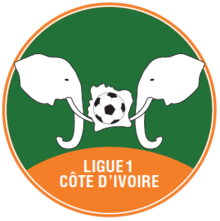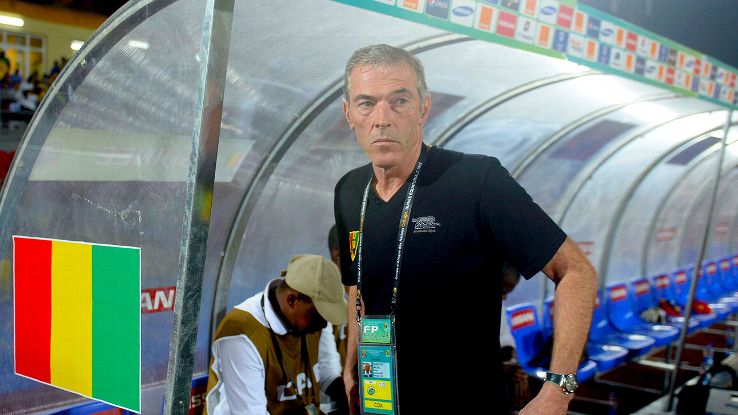
New Ivory Coast boss Michel Dussuyer facing high expectations

faces a new kind of pressure in leading the Ivory Coast
There are two, equally tough, kinds of jobs in football coaching: those with expectation and those without. Michel Dussuyer used to be an example of the former.
He was previously when he was in charge of Benin. The Squirrels, as they are known, are a smaller footballing nation with few accomplishments to their name. Then, Dussuyer began to move towards the latter with Guinea, a rising nation, who have been African Nations' Cup (ANC) quarterfinalists three times and are desperate to break through the ceiling. Now, Dussuyer has fully moved to the other end of the spectrum, with great expectations after being appointed Ivory Coast's new coach.
Dussuyer takes over the African champions, who will want no less than to continue being kings of the continent. His two-year deal means he will be responsible for the defense of the team's title, which will involve qualifying for and competing in the 2017 ANC, and the bulk of their 2018 World Cup qualifying campaign. Dussuyer will have the option of extending his deal for another two years, something he may consider should he oversee the team's progression to Russia for the 2018 World Cup.
Before Dussuyer even looks that far ahead, though, he may want to look behind to see if there is anything he can take out of his predecessor Herve Renard's experience or anything he can do differently. Renard's success with two different champions -- Zambia and Ivory Coast -- has always seemed to lie in his man-management, particularly the way he aligned himself with the talisman of the outfit.
When with Zambia, Renard was close to captain Christopher Katongo and it served Renard well. When Renard chose to axe star winger Clifford Mulenga from the squad for a disciplinary breach, Katogo defnded Renard and asked fans to respect his decision. For his part, Renard was equally supportive of Katongo and backed the skipper when he went through a patch of poor form at the 2013 ANC.
Ivory Coast's bigger names proved more difficult to form lifelong friendships with, but Renard made sure he was ready to receive Didier Drogba whenever the striker wanted. A month after Renard was appointed to the Ivory Coast job in July 2014, Drogba retired from the international game, but as is often the case with marquee men, as soon as the team's form dipped there were calls for him to return. Renard indicated that he would accept a Drogba u-turn and that the door remained open for him "any time, any day."
Renard even approached Drogba, and midfielder Didier Zakora who retired in September 2014, about returning for the 2015 ANC because he wanted to bulk up the squad with experience. Both declined, saying they wanted to concentrate on their club games and Renard vowed to respect that. However, the fact that Renard had reached out to the veterans helped his reputation.
Dussuyer will not need to go back to those players because Ivory Coast has moved on from Drogba and Zakora. Instead, Dussuyer can learn from Renard by cozying up to the likes of Yaya Toure, who is now the team's main man. Equally important for Dussuyer will be his relationship with the slightly younger group like Wilfried Bony and Serge Aurier who are likely to be the future Drogbas and Toures of the team.
That is where Dussuyer's path will have to diverge from Renard's. Unlike Renard, Dussuyer is not taking over a team with a galaxy of stars in their twilight but one with a selection of players still at their peak and a younger generation bubbling under.
The transition of the Ivorian team from its golden generation to a new crop begins under Dussuyer and he may be concerned with the depth at his disposal. Ivory Coast's under-23s were held to a goalless draw at home by a 10-man Zambian side in the second round of qualifiers for the CAF age-group tournament that will ultimately decide who goes to next year's Rio Olympics. The Ivorian under-23 side can still make amends for the result in the second leg and travel to the tournament, where they are likely to run into the likes of an in-form Egypt.
Dussuyer will not be involved at that level, but he will be keeping an eye on it nonetheless to get to know the talent pool he can choose from as the team grows and moves towards their goals. And in doing that Dussuyer may realise that expectation in any form, is what makes football coaching such a tough job.
Football : le Séwé Sport ivoirien saura-t-il relever les défis à venir ?
Malgré une année 2015 plus difficile à négocier, le Séwé Sport de San Pedro reste le club ivoirien le plus titré de ces dernières années.
Football : le Séwé Sport ivoirien saura-t-il relever les défis à venir ?
Malgré une année 2015 plus difficile à négocier, le Séwé Sport de San Pedro reste le club ivoirien le plus titré de ces dernières années.
Le Séwé ne sera pas champion de Côte d’Ivoire cette année. Le club de la ville portuaire de San Pedro avait pourtant pris l’habitude de squatter les sommets du football ivoirien. Le championnat de Côte d’Ivoire en 2012, 2013, 2014 et la coupe Félix Houphouët-Boigny en 2012 et 2013, tout en se hissant en finale de la Coupe de la Confédération africaine de football (CAF) fin 2014.
Pour un club fondé en 1977, et qui avait commencé à se faire remarquer dans les années 2000, le Séwé dispose d’un CV très présentable. Le club est certes encore loin du palmarès affiché par l’Asec Mimosas et l’Africa Sports mais le Séwé a gagné une légitimité certaine sur la scène locale, à l’ombre des deux géants d’Abidjan. « On nous prend au sérieux, parce que nous obtenons des résultats », se targue Eugène Diomandé, le président du Séwé Sport.
Obligé de jouer loin de ses supporters
La réussite sportive fulgurante de son club est d’autant plus surprenante que le Séwé souffre d’un déficit structurel important. Son stade, Auguste-Denise, d’une capacité d’à peine 8 000 places, et qui n’est pas homologué par la CAF l’oblige à jouer ses matches à domicile dans la capitale économique, loin de ses supporters. Eugène Diomandé n’y est évidemment pas insensible mais sa priorité est d’améliorer les conditions d’entraînement des joueurs avant, peut-être, de s’attaquer au dossier du stade
Car le Séwé Sport ne dispose pas d’un budget extensible. « Cela va de 500 000 euros à un peu moins d’un million », précise Diomandé. « Trouver de l’argent dans le contexte actuel est difficile », un phénomène amplifié par la prudence des sponsors. « Pour augmenter nos ressources, il faut parvenir à vendre des joueurs », ajoute le dirigeant, qui ne peut pas offrir de salaires mensuels supérieurs à 1 000 euros, hors primes et avantages en nature.
Nécessité de vendre les meilleurs joueurs
Cette nécessité de vendre rapidement ses meilleurs joueurs pour subvenir aux besoins quotidiens du club représente évidemment un frein à ses ambitions. « C’est difficile de construire sur la durée si vous vendez vos meilleurs joueurs tous les ans », estime Sébastien Desabre, ancien entraîneur de l’Asec aujourd’hui parti au Recreativo do Libolo (Angola). « Il faut à chaque fois modifier l’effectif », ajoute-t-il.
La saison 2014-2015, la plus compliquée de ces dernières années, vient en écho des propos de Desabre. En difficulté en championnat, le club s’est séparé au début du mois de mars de Gervais Rigo, son emblématique entraîneur, qui, en deux ans, a remporté deux championnats et la Super Coupe, tout en atteignant les quarts de finale de la Ligue des Champions en 2013 et la finale de la Coupe de la CAF l’année suivante. Avec le départ de Gervais Rigo, une nouvelle ère s’est ouverte avec son lot d’incertitudes.
ligue1 : Afficher les matchs de la Journée














Nenhum comentário:
Postar um comentário